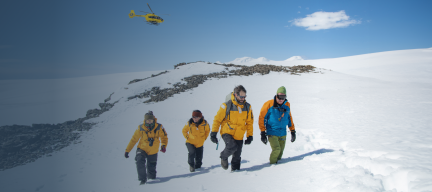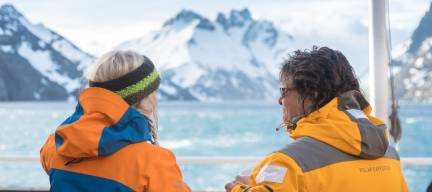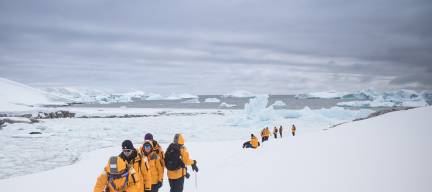The best time to visit South Georgia Island depends largely on what you intend to do while on your journey. There’s plenty to see and experience on the island, and you can get inspirational ideas from our latest guide on how to appreciate all there is to do on South Georgia Island.
South Georgia Island is a mountainous, snow-covered island in the Southern Ocean. South Georgia is also known by the nickname of the Galapagos of the Southern Ocean. Captain James Cook visited and claimed the land in 1775 as one of the southernmost outposts of the British Empire.
However, the island was not explored in earnest until Sir Ernest Shackleton arrived at the island in 1916 during the middle of World War 1. Shackleton had attempted a trans-Antarctic exploration, but disaster devastated the fleet, leaving much of the crew to coast through the ocean on ice drifts in search of land. Shackleton boarded a whaling boat and arrived at South Georgia where he led the first crossing of the island. He later rescued his entire crew and led the expedition back to Britain.
Sir Ernest Shackleton (second from left): one of the most courageous explorers during the Heroic Age of Exploration. Quark Expeditions’ guests have the opportunity to honor Shackleton at his grave on South Georgia Island.
Shackleton led a second expedition in 1921, this time in an effort to cross the entire Antarctic continent. Unfortunately, his health failed him on the journey and he died in 1922 while the crew stopped at the site of Grytviken on South Georgia Island. Shackleton’s remains were buried at the Grytviken cemetery, which has become one of the popular tourist attractions on the island.
Where is South Georgia Island?
Located within the middle of the Southern Ocean, South Georgia’s geographic location forms an odd triangular shape when measuring its distance between the tip of South America and the northernmost point of the Antarctic Peninsula.
After it was claimed as part of the British Empire, South Georgia was made a dependency of the Falkland Islands, which are located 1,300 km west-northwest of South Georgia. Both South Georgia and the Falkland Islands remain within the British Commonwealth as official British overseas territories.
South Georgia is populated with thousands and thousands of king penguins—amongst other
wildlife species. Photo: Acacia Johnson
Officially, South Georgia Island is a named part of the territory “South Georgia and the South Sandwich Islands.” South Georgia is the largest of the South Shetland Islands with smaller islands like Trinity Island, Willis Island, Saddle Island, Prion Island, Annenkov Island, Cooper Island, and more making up the collective island chain. Argentina has laid a claim to much of the South Sandwich Islands to challenge the British territorial rights, though there have been no hostilities over the area since the Falkland Islands War in the 1980s.
How to get to South Georgia Island
Since it’s an island in the middle of an ocean, there’s no way to approach South Georgia Island by land. There are also no airports or safe landing strips for aerial flights to approach the island. The only way to safely travel to South Georgia is by ship.
However, the conditions in the Southern Ocean prove to be too much for ill-prepared sea travelers. It takes a well-equipped and constructed vessel built to withstand polar climates, massive waves, and gusting winds to safely navigate your way to South Georgia Island. Quark Expeditions’ Ultramarine is a prime example of a ship designed and engineered to travel in this sub-Antarctic region.
You can experience an Ultramarine voyage with our special Falklands, South Georgia, and Antarctica: Explorers and Kings expedition. This is a 20-day adventure that begins in Ushuaia, Argentina where you’ll embark on your seafaring voyage to the Falkland Islands, the Drake Passage, and even the tip of the Antarctic Peninsula near the Lemaire Channel.
What to expect from a visit to South Georgia Island
You’ll stop at South Georgia on the 8th day of your journey. Once on the island, your adventure guides will help you appreciate all there is to experience on a South Georgia adventure. You’ll see amazing species of wildlife like King Penguins, seals, and the occasional whale pod swimming near the shoreline.
Also included is a visit to the Grytviken cemetery where you’ll see the gravestone of Sir Ernest Shackleton.
In addition to the gravesite of Sir Ernest Shackleton, your adventure guides will take you to other famed locations on the island. South Georgia is known as a location with abundant relics from past explorers who arrived on the island decades ago. Many of the remains from those adventures are scattered about the island.
Fur seal pup photographed at Grytviken, South Georgia. Photo: Acacia Johnson
What to do on South Georgia Island
Adventurers who appreciate wildlife expeditions will thoroughly enjoy their time on South Georgia Island. One of the best places to see wildlife is Salisbury Plain, a vast expanse of greenspace that intersects with Grace Glacier. It’s here that a massive colony of over 250,000 King Penguins, which stand approximately three feet tall. They’re similar to their cousins the Emperor Penguins, blending colors of black, white, and sunlit orange near their beaks.
The best way to see King Penguins and all other types of penguins in South Georgia is through our esteemed adventure South Georgia and Antarctic Peninsula: Penguin Safari. This is a 16-day adventure, a more streamlined journey through the Southern Ocean than the corresponding Explorers and Kings expedition. You’ll stop at South Georgia on Day 7 of your journey for a two-day wildlife safari.
Penguins aren’t the only wildlife you’ll see on the island. South Georgia is also home to a thriving seal population, specifically elephant and fur seals. You’ll also come across other species of birds like albatross, petrels, and seabirds that burrow near the shore of the island.
Best time to visit South Georgia Island
So when is the best time of the year to visit South Georgia Island? Timing is very important for an expedition to South Georgia. Winter conditions make for much stronger and higher waves that wash ashore, making it difficult to navigate the surrounding waters for even the most well-equipped vessels like the Ultramarine.
Keep in mind that, since South Georgia is in the Southern Ocean, it’s part of the southern hemisphere. Therefore, summer and winter are opposite times of the year for travelers who are venturing to the islands from places like North America or Europe.
For that reason, the best times to visit South Georgia lie between November, December, and January. This is the time of year when conditions are calmer, allowing for a safe approach of the islands from the sea and typically wind gusts are less extreme for adventurers roaming across the island’s shores in search of those wildlife safari experiences. Make sure you have your travel equipment packed and your camera ready to snap some amazing photos!
Best way to experience South Georgia Island
There are several adventures you can undertake to experience all that South Georgia has to offer, such as the Penguin Safari and the Explorers and King’s expeditions. There’s one other voyage that we highly recommend, which is Epic Antarctica: Crossing the Circle via Falklands and South Georgia.
This is a 23-day journey that encompasses most of the known destinations to visit across the Southern Ocean. It’s a similar journey to the Explorers and Kings adventure with a departure from Argentina, and educational stops at the Falklands, South Shetland Islands, Anvers Island, and the Lemaire Channel. The difference between this journey and the Explorers and Kings adventure is that you’ll officially cross the Antarctic Circle and approach one of the southernmost tourist destinations on the entire planet. In terms of global travel, relatively few can say they’ve officially visited the Antarctic mainland, and you have an opportunity to become one of those rare adventurous souls.
St. Andrew’s Bay, South Georgia, is a popular stop to observe large penguin rookeries. Photo: Acacia Johnson
The leg of the trip that includes South Georgia encompasses Days 8 through 11 of the entire journey. During your four-day stopover, you’ll have a chance to see reemerging whale pods swimming near the shoreline, especially minke whales that like to make their homes near isolated land masses in frigid waters. South Georgia was once a common stop for whalers in the Southern Ocean, and you’ll also see abandoned whaling stations and outposts for their ships on the shores of the island.
There’s an interwoven relationship between the grasses, mountains, and beaches on South Georgia Island. The land itself is one of the prime attractions of the location as it provides topographical sights to capture on camera as each element of the land bleeds into the next. The tapestry of these immersive bodies of nature is a sight to behold in itself, so make sure your camera is ready to capture the stunning highlights!









